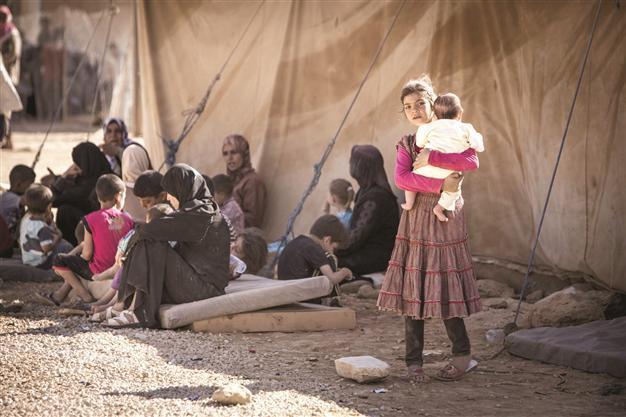UN expects huge influx of refugees from Syria
UNITED NATIONS / GENEVA
 The U.N. refugee agency warned yesterday there could be as many as 700,000 Syrian refugees fleeing the war-torn nation by the end of the year, as it stepped up its call for emergency funding.
The U.N. refugee agency warned yesterday there could be as many as 700,000 Syrian refugees fleeing the war-torn nation by the end of the year, as it stepped up its call for emergency funding.“There may be up to 700,000 Syrian refugees in neighboring countries by the end of the year,” Panos Moumtzis, the United Nations High Commissioner for Refugees’ (UNHCR) chief coordinator for Syrian refugees, told reporters in Geneva. “We are running out of time.” The agency forecast that Turkey could host 280,000 by the end of the year, Jordan 250,000, Lebanon 120,000, and Iraq 60,000. Faced with the soaring need for aid after 18 months of brutal conflict in Syria, humanitarian agencies upped their call for funds to $487.9 million to sustain operations until the end of the year.
In June, when the UNHCR first updated its regional response plan, it made plans for 185,000 refugees. Since then the number has tripled, the agency said, with 100,000 people fleeing Syria in August and 60,000 so far in September.
The number of Syrian refugees who have sought refuge in Turkey has reached recently 87,774. At present, only $141.5 million in funding is available, just 29 percent of the overall request, Moumtzis said, according to Agence France-Presse, stressing the urgency of the appeal in the face of an “overwhelming increase” in the number of people trying to escape the escalating bloodshed.
Winter conditions
The approach of winter made the appeal even more important, Moumtzsis said, adding that winterized tents, clothing, blankets and heaters were needed to prepare for the “very harsh” months to come. “We’ve been overwhelmed,” said Moumtzis. “We need the funding urgently to respond as thousands of people are crossing the border.” Aid agencies are struggling to keep up with the constant exodus, which he put at a rate of 1,000 people a day and sometimes up to 2,000.
Funding is essential to provide basic life-saving aid for those crossing the borders, Moumtzis said, adding that a focus on education and healthcare was also necessary given the high ratio of child refugees fleeing Syria. The UN children’s agency UNICEF also took part in the joint appeal, saying that more than 50 percent of the refugees were under the age of 18 and one fifth were under five.
Save The Children said there are a “disproportionate number of women and children in need” in the neighboring countries hosting refugees: Iraq, Jordan, Lebanon and Turkey. Women and children accounted for around 75 percent of the refugees overall, but in Jordan’s Zaatari camp, children accounted for 65 percent of the population, the charity’s emergency programs director Michael Penrose said.
“The message we are getting on the ground is that host governments and communities have shown a great deal of welcome [to Syrian refugees], but they are stretched,” Penrose said.
















